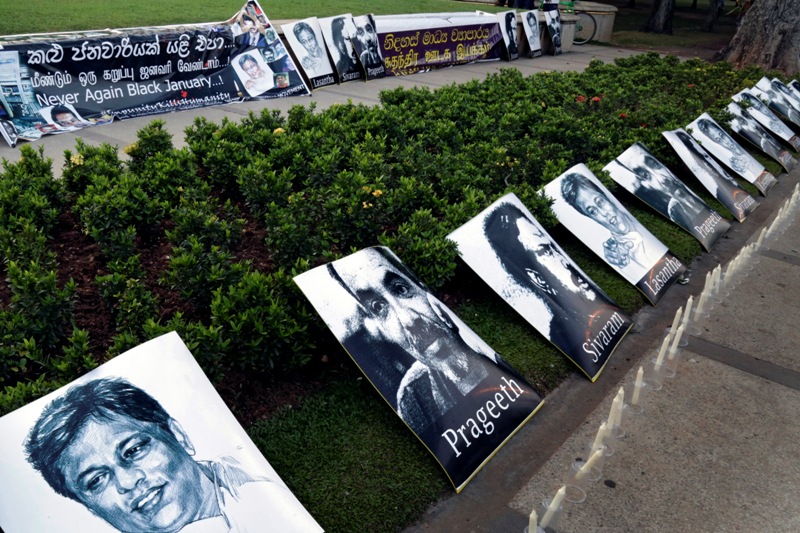In a letter to Ms. Hanaa Singer, Resident Coordinator of the United Nations, Sri Lanka, media organistations says that ” We do not want the assurances of the United Nations. We want it to take and compel action. The undersigned believe it is essential for the UN to persist in pressuring the Sri Lankan government to take accountability forward. A first step would be to ensure that the current government fulfills the many promises it made with regard accountability for crimes committed against journalists. This enduring violence and culture of impunity must end. We trust you will take decisive, sustained action to ensure that Media Freedom and Freedom of Expression are installed to the fullest in Sri Lanka.”
The text of the letter follows:
January 14, 2019,
Resident Coordinator of the United Nations,
Sri Lanka.
Dear Ms. Hanaa Singer,
Continued inaction, impunity and insensitivity in murder and violence against journalists.
Four years after President Sirisena was elected to office, in part anchored to promises to address Sri Lanka’s awful record of freedom of expression and violence against journalists during and after the war, little to no progress is evident in any investigation to bring the culprits to book. Disappointingly, despite an enjoyment and expression of human rights not remotely possible under the former regime, the undersigned note with concern, disappointment and growing anger that meaningful progress in investigations remains elusive.
The Black January Movement, comprising of The Sri Lanka Working Journalists Association, The Free Media Movement, Federation of Media Employees’ Trade Union, Sri Lanka Young Journalists’ Association, The Tamil Media Alliance, The Muslim Media Forum, Internet Media Action and Media Movement for Democracy and campaigning organisations recall the violent, dangerous time for journalists during the war and even after May 2009, especially for those working in the North. Investigative journalists and those who wrote on the military, high level corruption, political developments and high-ranking government officials were repeatedly threatened, abducted, murdered and tortured. Media institutions were blocked, banned, bombed and burned. The context was overwhelmingly one of anxiety and fear, underwritten by government, overseen by the military, supported by intelligence services and condoned by those in power. We recall the white vans that served – aside from their use to abduct journalists in broad daylight – as a symbol that represented a culture of impunity. All this was recorded meticulously by the United Nations, including by the Special Rapporteur for the Freedom of Expression and other key mandate holders.
Few left Sri Lanka, Others stopped writing, or switched to a tone that didn’t expose them to violence. The lack of any meaningful progress around accountability and, of late, the growing political instability, contributes to many journalists who left, not returning.
As the Committee to Protect Journalists notes, despite so many journalists being killed over nearly thirty years of war, there have been no investigations to hold perpetrators accountable.
Successive governments have only made promises. No meaningful progress is visible. We also recall that in the years before 2004, journalists as well as several artists were murdered simply for exercising their freedom of expression. Even those in power today do not seem interested in ensuring justice for them.
We believe that, in the interest of upholding media freedom, the State has the responsibility to collect and publicly acknowledge facts around crimes committed against individuals exercising their right to expression; be they journalists, media workers or media organisations.
As a collective of media organisations we also believe that the State has the responsibility to investigate and deliver justice in the cases of murders, abductions, disappearances and attacks against journalists, media workers and media organisations. This could be done by way of an independent commission that inquires and gathers all information necessary, to aid in the process of accountability. Given the marked failure of so many commissions in the past to have their recommendations translated into policy or practice, we stress that any independent commission or investigative process requires what remains tragically elusive in Sri Lanka – political will.
The delay in justice for these cases is indicative of the culture of impunity that prevails in Sri Lanka. We have had promises, statements, commitments, high-level visits, negotiations, condemnations, diplomatic pressure, International solidarity, commissions of inquiry, investigative reporting, and presentations to bilateral and multilateral fora, and briefings to governments. We have voted in successive governments based on promises to bring an end to impunity. We have been assured, without feeling assured. Victims, survivors, families, friends and colleagues have had to live in the hope of justice, despite the faintest of hope and that too, dying away.
We do not want the assurances of the United Nations. We want it to take and compel action. The undersigned believe it is essential for the UN to persist in pressuring the Sri Lankan government to take accountability forward. A first step would be to ensure that the current government fulfills the many promises it made with regard accountability for crimes committed against journalists.
This enduring violence and culture of impunity must end. We trust you will take decisive, sustained action to ensure that Media Freedom and Freedom of Expression are installed to the fullest in Sri Lanka.
Singed by
The Sri Lanka Working Journalists Association, The Free Media Movement, Federation of Media Employees’ Trade Union, Sri Lanka Young Journalists’ Association, The Tamil Media Alliance, The Muslim Media Forum, Internet Media Action and Media Movement for Democracy.
